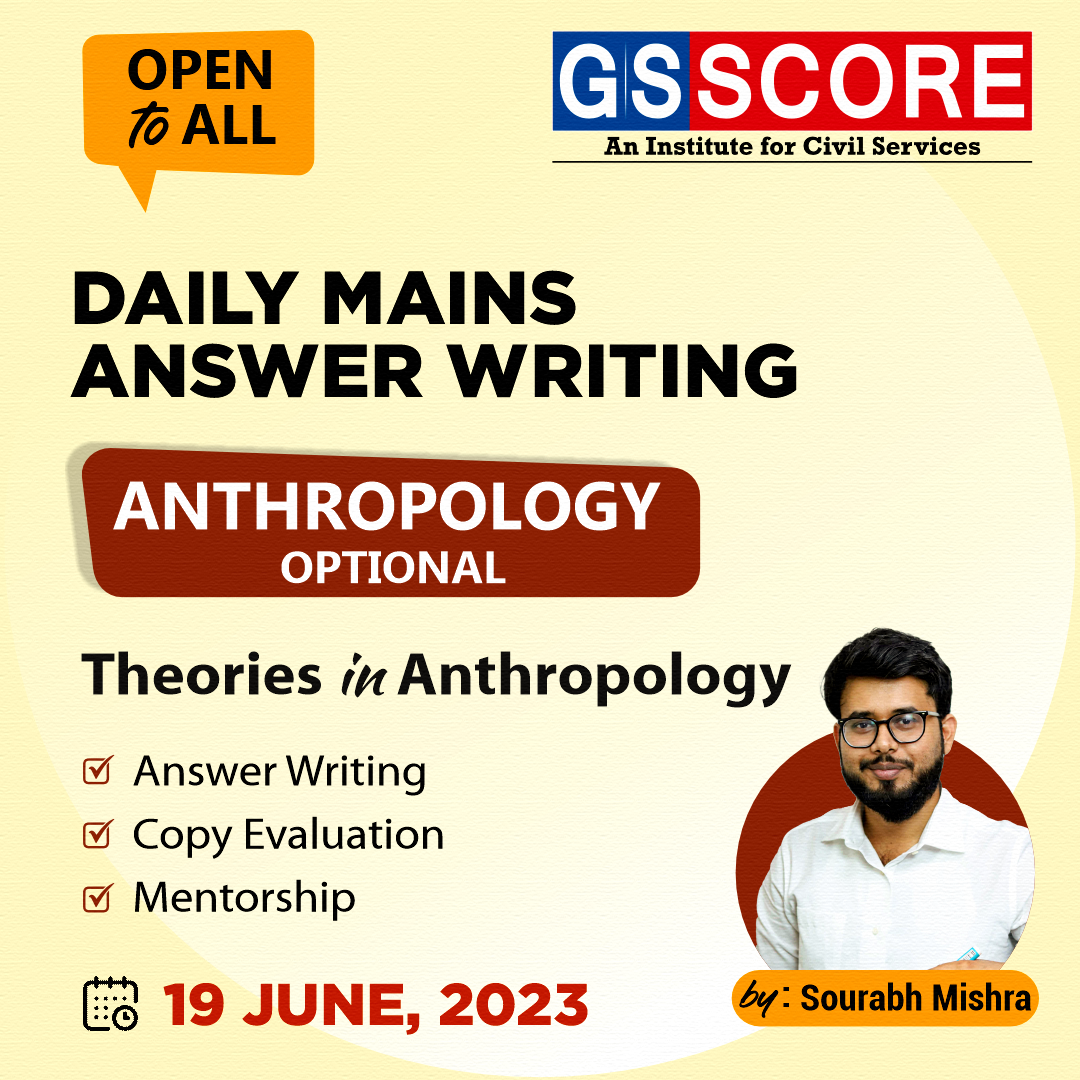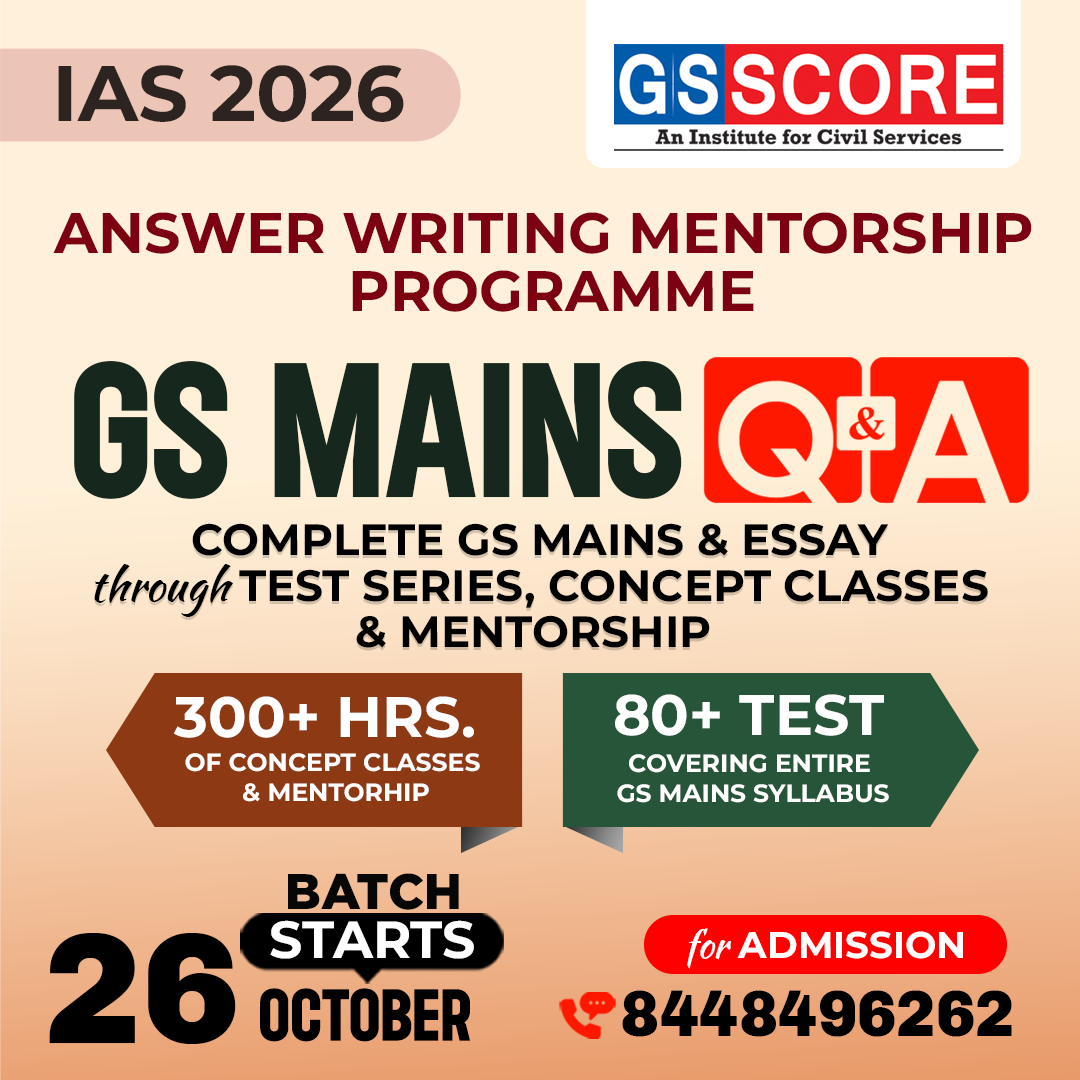


Instruction:
- There will be 2 questions carrying 10 marks each. Write your answers in 150 words
- Any page left blank in the answer-book must be crossed out clearly.
- Evaluated Copy will be re-uploaded on the same thread after 2 days of uploading the copy.
- Discussion of the question and one to one answer improvement session of evaluated copies will be conducted through Google Meet with concerned faculty. You will be informed via mail or SMS for the discussion.
Question #1. Explain the concept of unilinear cultural evolution highlighting the role of Tylor and Morgan.
Question #2. Explain how personality impacts the culture of a society. Explain the contribution of Ruth Benedict in culture and personality school.
(Examiner will pay special attention to the candidate's grasp of his/her material, its relevance to the subject chosen, and to his/ her ability to think constructively and to present his/her ideas concisely, logically and effectively).
STEPS & INSTRUCTIONS for uploading the answers
Step 1 - The Question for the day is provided below these instructions. It will be available at 7:00 AM.
Step 2 - Uploading of Answers : Write the answer in A4 Sheet leaving proper margins for comments and feedback and upload the PDF in MY ACCOUNT section. Click on the option of SUBMIT COPY to upload the PDF.
Step 3 - Deadline for Uploading Answers: The students shall upload their answers by 7:00 PM in the evening same day. The first 50 copies will be evaluated.
Step 4 - Feedback : Mentors will give their feedback for the answers uploaded. For more personalised feedback, join our telegram channel by clicking on the link https://t.me/mains_answer_writing_cse . A one-to-one session will be conducted with the faculty after copy evaluation in 72 Hrs.
Model Answer
Question #1. Explain the concept of unilinear cultural evolution highlighting the role of Tylor and Morgan.
Introduction:
The changes are taking place in the manifold aspects of culture including, technology, economy, social institutions, art, and literature. Differences of opinion exist among anthropologists regarding the evolution of culture. These differences in perception led to multiple theories of cultural evolution. All the theories related to cultural evolution are collectively known as cultural evolutionism in Anthropology.
Cultural Evolution may be defined as a process by which different successive forms in the socio-cultural institution or culture of humankind are developed over different periods of time.
Classical Evolutionism:
- The main proponents of classical evolutionism are E B Tylor, James Frazer, R Marret, L H Morgan, J J Bachofen, and Adolf Bastian. They are also known as unilineal evolutionists as they believed that human culture evolved in unilineal sequence, stage after stage, simple to complex.
- The evolutionists assumed that cultural parallels or cultural similarities come into existence due to the psychic unity of humankind, suggesting that human minds share similar characteristics all over the world and react and think in similar ways in similar environmental conditions.
Features of Classical Evolutionism:
- Human culture as a whole or social-cultural institutions evolve in unilineal sequence, stage after stage- savagery, barbarism, and civilization.
- The direction of cultural evolution is from simple to complex, from similarity to dissimilarity, from indefinite to definite, and from homogeneity to heterogeneity.
- Different stages of evolution can be established by the historical method and the comparative method.
- Similarities in culture or cultural traits are caused by the psychic unity of humankind and parallel inventions.
- At the higher stage of culture, certain remains of the earlier stages can be traced, which are termed as cultural survivals. Such remains reveal the conditions of the earlier stages of human culture.
British Classical Evolutionism: E B Tylor (1832-1917):
- E B Tylor talked about the unilineal form of cultural growth. Hence he was called a unilineal evolutionist.
- Unilineal evolution means human culture evolved in a unilineal sequence, stage after stage, simple to complex.
- Accordingly, human culture has developed through the stages of savagery to barbarism, and finally to civilization.
Savagery ???? Barbarism ???? Civilisation
- Tylor is called the father of modern anthropology for his contribution to the concept of culture.
- He gave the classical definition of culture in his book Primitive Culture (1871): “culture is that complex whole which includes knowledge, belief, art, morals, law, custom and any other capabilities and habits acquired by man as a member of society”.
- The basic idea underlying Tylor’s theory was the continuity of culture in the process of its development from previous stages to the succeeding stages.
- Humanity as a whole passed through the process of cultural evolution from a primitive, pre-historic stage to the middle stage and finally to a more advanced civilized stage, which has now been attained in our world.
Stone Age ???? Bronze Age ???? Iron Age
- Tylor opined that Animism (belief in soul) was the earliest form of religion from which Polytheism and the present stage of Monotheism have developed.
Magic ???? Religion ???? Science
- According to Tylor, the evolution of material culture has developed from the stone age, the bronze age, and finally the Iron Age.
James Frazer views, that all societies progress through three successive stages of evolution. These are magic, religion, and science. The primitive human was unaware of things happening around them. They believed magic can control everything including nature.
American Classical Evolutionism: L H Morgan (1818–1881)
- L H Morgan, in his book Ancient Society (1877), classified the development of culture into three major periods. They are savagery, barbarism, and civilization.
- The first two periods are again sub-divided into lower, middle, and upper periods. These ethnic periods and their subdivisions were defined by the following sequence of technological developments.
- Morgan studied in detail the Iroquois Indian, which was published in the book League of the Iroquois (1851).
- While he was inquiring into the rules of descent, he was struck by their system of naming the kins. An Iroquois child called one's mother's sister “mother”, father’s brother as “father”, grandmother’s sister as “grandmother”, and so on.
- Children of two or more sisters called each other ‘brother” and “sister”. Morgan called this a classificatory kinship system contrasting it with the “descriptive system” in which the terms of address reveal the exact relationship.
Further, he received the information that the Tamils in India used a classificatory system, which led Morgan to conclude that the American Indian tribes were of Asiatic origin.
Conclusion:
Classical evolutionists are classified into two - classical evolutionists and neo-evolutionists. The main proponents of classical evolutionism are E B Tylor, James Frazer, R R Marret, L H Morgan, J J Bachofen and Adolf Bastian. They are also known as unilineal evolutionists and the culture of humankind is developed over different periods of time.
Question #2. Explain how personality impacts the culture of a society. Explain the contribution of Ruth Benedict in culture and personality school.
Introduction:
Culture according to this school of thought is acquired, imitated, and learned. It gives rise to character formation or development of personality traits before the period of adolescence.
Personality refers to the integrated and dynamic organisation of physical, mental, and social qualities of an individual as that manifests itself to the other people in the give and take of social life. It is a more or less consistent behaviour pattern of an individual.
The emergence of the Concept:
The Culture and Personality movement was at the core of anthropology in the first half of the 20th century. It examined the interaction between psychological and cultural forces at work on the human experience.
Culture and Personality were too divided to really be considered a school of thought. It had no orthodox viewpoint, centralized leadership, or coherent training program (LeVine 2001).
However, there were also some basic ideas with which most practitioners would agree. At a minimum, these would include:
- Adult behaviour is culturally patterned.
- Childhood experiences influence the individual’s personality as an adult.
- Adult personality characteristics are reflected in cultural beliefs and social institutions, such as religion (LeVine 2001).
Characteristics of the Personality:
While we talk about personality, we have certain notions that it is related to the outward appearance and performance of an individual. But personality has certain other characteristics:
- Personality is acquired
- Every personality is unique
- Personality is influenced by social interaction
- Personality refers to the persistent qualities of an individual
- Personality is not a mysterious phenomenon
- Personality is not related to body structure alone.
Culture and Personality School of thought:
- American anthropologists such as Ruth Benedict, Margaret Mead, Ralph Linton, and Abram Kardiner are the pioneers of the Culture and Personality School of thought or Psychological anthropological theories.
- There are three approaches that had emerged from the contributions of these scholars to study and examine the inter-relationship between culture and personality. These include:
- Personality builds culture.
- Culture determines the formation of personality.
- Culture and personality are inseparable and influence each other.
Personality Builds Culture- Ruth Benedict:
- According to Ruth Benedict, culture is personality writ at large. Culture is not self-created but personality builds culture. Human beings are the creators of culture in order to fulfil their various kinds of needs.
- It is the individual (personality) who plays a significant role in handling the culture from one generation to another. He says culture is a gift of personality. According to Benedict, there are two kinds of genius (personality) found in human society.
Apollonian: The word apollonian is from the Greek god Apollo, the peaceful sun deity. Apollo is regarded as the god of peace, discipline, kindness, and humanity by the Greek people. Thus, in the apollonian pattern of culture, one finds the existence of peace, kindness, and discipline. Benedict cites the example of the Pueblo of New Mexico as the representative of Apollonian culture.
Dionysian: The word Dionysian is derived from the name of the Greek god Dionysius. Dionysius is the symbol of luxurious life and drinking. In the Dionysian culture, a lot of storms and changes are experienced. Benedict cites the example of Dobu and Kwakiutl cultures of the North West coast of America as the representatives of Dionysian genius.
Dobu of Melanesia is exactly in contrast with the Pueblo in character and temperament. Among them occurred frequently conflict, competition, and violence. They usually used magic to harm others. People of Kwakiutl do not believe in religious practices.
Conclusion:
In their culture, wealth determines status and prestige. Everyone becomes busy earning money in one way or another. Those with less money feel ashamed on account of it. Benedict’s study clearly reveals the influence of personality on culture. The cultures of these groups differ because their members have different characters and personalities. Accordingly, they behave in cultural groups.


